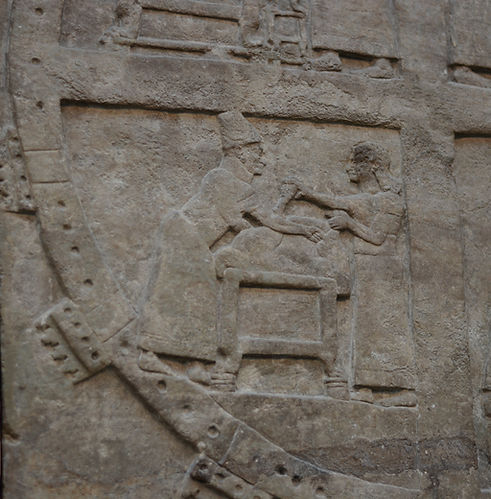Divination
What is divination?
Divination is the decoding of divine will, which was revealed in all sorts of ways, from the movements of the stars in the sky to those of ants on the ground, from the contents of dreams and exclamations people uttered while they were asleep to more unusual events like a cow giving birth to a calf with two heads. In this way, Mesopotamians believed that the gods would announce the death of kings, floods and famines, successful battles, or personal gains and general good fortune. But people could also ask questions directly, and this is what liver divination (extispicy) was for.

Fragment of a palace wall from the North West Palace at Nimrud depicting extispicy. (BM 124548).

Extispicy in modern times
What started as an entertaining talk for a university open day has since become a serious part of my research – not because I sincerely believe in extispicy, but because it gives us some of the earliest evidence in history for how human beings reason and think. It also allows me to compare the ancient texts that I study with what the diviners would have seen in real life. I begin by asking the livers a question and then analyse them in the same way that the Mesopotamians would have done, looking for positive and negative signs, and then look up the results in a series of clay tablets that explain what individual omens mean.

Looking at livers also makes a serious underlying point about how humans have coped with uncertainty throughout history, and still struggle to today. People have developed techniques as varied as astrology, tarot cards and even peering into entrails in response to the agony of not knowing, or the strain of trying to make a difficult decision. We all want to know what the future has in store, and have come up with ingenious ways of trying to find out, from opinion polls and data modelling to Paul the octopus, who developed a reputation for picking the winners of football matches during the 2010 World Cup. But are our methods really any better than looking inside a sheep?
K. 7000 Fragment of a clay tablet inscribed with liver omens

Throughout the long history of Mesopotamia, all kinds of affairs of state were put before the gods. It was a serious matter, and interpreting the entrails was held to almost scientific standards of exactitude. This was not a vague or woolly process, but a real attempt to ensure “accuracy” that could not be manipulated.I try to replicate this and follow the texts as closely as I can. The questions I ask tend to be political too. In the past, I have asked about the election of Donald Trump (in 2016, 2020, and 2024) the French elections everyone was worried about in 2017, Brexit, the likelihood of a general election in the UK in 2024, and most recently, I expanded to Oscar predictions.
If you would like to see a reading done on a real sheep liver, click here.
BM 92668 Clay liver model